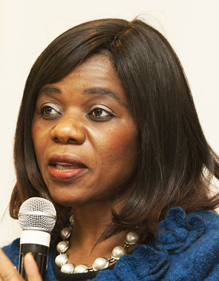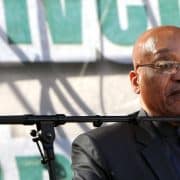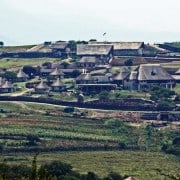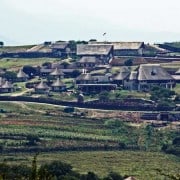|
Getting your Trinity Audio player ready...
|
 She speaks in whispering tones and is always immaculately dressed. When she walks into a room and begins speaking, people sit up and listen. Fearless and resolute, this is the woman who has taken on some of South Africa’s most powerful politicians – and won. This woman is Advocate Thuli Madonsela, the country’s Public Protector.
She speaks in whispering tones and is always immaculately dressed. When she walks into a room and begins speaking, people sit up and listen. Fearless and resolute, this is the woman who has taken on some of South Africa’s most powerful politicians – and won. This woman is Advocate Thuli Madonsela, the country’s Public Protector.
A human rights lawyer and activist, with beginnings as a unionist and assistant teacher, Madonsela helped draft South Africa’s world-famous Constitution after the country became a democracy in 1994 – giving up a Harvard scholarship to do so.
The office of South Africa’s Public Protector is tasked with strengthening constitutional democracy and good governance. It’s a chapter nine institution, meaning it’s independent from the state and has the power to investigate and make recommendations on improper dealings within government, which hamper service-delivery, abuse taxpayers’ money and perpetuate poverty and inequality.
Madonsela has fulfilled this mandate with faultless precision, vigour and determination since taking up office in 2009, promoting a culture of constructive dialogue around service-delivery failures as opposed to violent protests.
Investigating the likes of expelled ANC Youth League leader Julius Malema, controversial ex-police chief Bheki Cele and a string of big-spending government ministers, Madonsela is turning up the heat on abusive office bearers.
Corruption Watch’s director David Lewis least year described her as “South Africa’s, most important bulwark against corruption”.
Her probes so far have led to the axing of at least two ministers – the late Sicelo Shiceka of Cooperative Governance and Public Works’ Gwen Mahlangu-Nkabinde – and Cele, who was found guilty of authorising a dodgy lease deal worth billions of rands.
Next on her list is President Jacob Zuma’s Nkandla residence, which is currently undergoing a lavish upgrade with about R206-million in public funds. The findings of this probe are expected sometime this month.
With a few years left until her term ends in 2016, this unassuming 49-year-old mother of two, speaks to Corruption Watch about her time in office so far and the role women are playing in the fight against corruption:
How do you feel about media labelling you SA’s “one-woman corruption crusader”?
It’s a humbling label, but misleading. Even in the office, I do not act alone but am part of a dedicated and competent team. Beyond the office there are many others who play their part equally, if not more excellently, in combatting corruption.
Why do you think there are so few women leaders in SA who are willing to speak out strongly against corruption within government? Is it because it is risky, isolating?
Many speak strongly, quietly, but effectively as whistle blowers. There aren’t enough women in powerful positions and the few in power often don’t have enough organisational roots to challenge the men they find in powerful enclaves within the organisations they run. Speaking out is indeed risky and isolating.
Who is your role-model?
They are many. Among them are Albertina Sisulu and Pat McFadden
What keeps you awake at night?
I sleep like a baby. But I do worry about the costs of indifference and self interest in the public sector. I have seen too much of the pain caused on ordinary people by indifference and selfishness.
Do you ever find the media attention and expectations from the public too much to handle? How do you cope?
I feel privileged that the media and the public think the work my team and I do matters and that our efforts count. I often feel that some of the expectations exceed our capacity to deliver given that we are a team of less than 300 full-time employees plus 100 trainee investigators with a budget that is less than R200-million – even after a thoughtful increase from Treasury.
What personal lessons did you learn when your deputy turned against you?
I learned that I need to listen well so that I hear what is not said. Truth be told, my deputy became “bitter” because she felt left out, my intentions did not matter, the impact did.
What types of corruption in South Africa need the most urgent attention, in your opinion?
- Procurement-related corruption needs urgent attentions it eats all our resources through shady work, overcharging and false billing. It also destroys genuine entrepreneurship as it fosters survival of the weakest in terms of skills and business owners.
- Retail Corruption should also be given urgent attention as it risks corrupting the soil of the nation – as has happened in parts of West Africa.
What are three things, in your opinion, that foster a culture of corruption in the public sector?
- Competency deficit in supply chain management
- Lack of respect for rules and authority
- Lack of consequences for wrong-doing
What has been the worse form of criticism you’ve received since taking up the role of Public Protector?
It was said that I was not impartial and favoured the Democratic Alliance (DA). My deputy went further to say I changed a report with adverse findings against the DA until the local government elections had passed. All of this was not only untrue, but there is incontrovertible documentary evidence that I was fair and that I got the draft report long after the local government elections.
What are your plans after completing your tenure as Public Protector?
I plan to write and lecture on administrative investigations, administrative justice and ombudsmanship for a year or two. Thereafter I plan to join the bar while continuing with training in ombudsman practice.
What happens when you have to mingle with ministers in government, do they avoid you? Do they ever send you letters or emails, accusing you of being unfair?
Things have evolved in the last three years. We exchange pleasantries, including comments on the weather. A few ministers have written to seek clarity on methodology. Only three investigated ministers publicly complained that I was unfair and only one observing minister publicly accused me of strange things, I am yet to receive evidence of from him despite several requests.
What is the one single case that has had the biggest impact on you since becoming Public Protector?
It was a complaint of abuse of power against the Commission for Conciliation, Mediation and Arbitration (CCMA). It highlighted the cost of indifference to me – power-holders fail to see and prevent the cruel impact of their decisions.
What are the three most important lessons you’ve learned since becoming Public Protector?
- Never prejudge any case – always keep an open mind and when investigating, take all responses with a pinch of salt.
- Every member of the team adds value and such value cannot be realised through criticism
- Indifference and self-interest are the worst forms of public sector maladministration.
How do you deal with knowledge that you can’t help each and every individual who comes to you with a valid case, irrespective of how serious it may be?
I’m saddened by many of the injustices that are brought to my attention but fall outside my jurisdiction. My team and I try to help through advice and referrals.
I hear that you were once an assistant teacher? Please tell us more about that …
I was an assistant teacher at Naledi High in the early eighties. I had dropped out of university although having obtained a B+.
Did you apply for the job as Public Protector – or were you nominated? Who “chose” you?
I was nominated by the South African Women in Dialogue NGO. The person who chose me was Martha Muller whom I had served with in intersectional projects on women and gender.
When you started the job in 2009, what were your immediate fears and goals?
My key goal was to enhance the office’s effectiveness in meeting the ordinary person’s administrative justice needs. I told parliament I would place emphasis on Alternative Dispute Resolution (ADR). I also wanted to improve public access visibility and trust. The impact of the office in strengthening constitutional democracy was also a priority.
My fears included my ability to lead a team I had not chosen or groomed. I was also concerned about my investigative skills, hence I immediately attended courses to enhance my competencies in this area. I was also a little concerned about the politics of the job.
Looking back, how do you feel about those fears and goals now?
I now realise that I need not have had those fears. I found a competent and dedicated team that embraces the philosophy of learning and growing together. Regarding investigative skills, I learn and grow every day together with my team. Regarding politics, I’ve learnt to anticipate and let the storms pass knowing I did my best in finding and telling the truth as it is.
What message do you have for women who are victims of corruption in South Africa – and how can they fight it?
Play your part as sincerely as possible. Understand and act within the law, primarily the Protected Disclosures Act to limit the risk of victimisation or retaliatory action. Report any wrong-doing, not as vindictive action for perceived personal wrongs, but as a heroic act to protect public resources.
Do you see holding government accountable in South Africa’s public sphere as mostly a man’s game?
Not at all. Women are playing their part. Many don’t do so publicly, but act as whistle-blowers or voices of reason whether or not decisions are contemplated or made.
How is it being a woman in the South Africa political arena (even though your office is a chapter 9 institution)?
It is an honour, but a position that has invited a lot of attention. It seems that the firmness with which I make decisions was not expected from a woman. The positive feedback is extremely humbling and energising. Women also say they are inspired to stand firm on what they believe is right.







